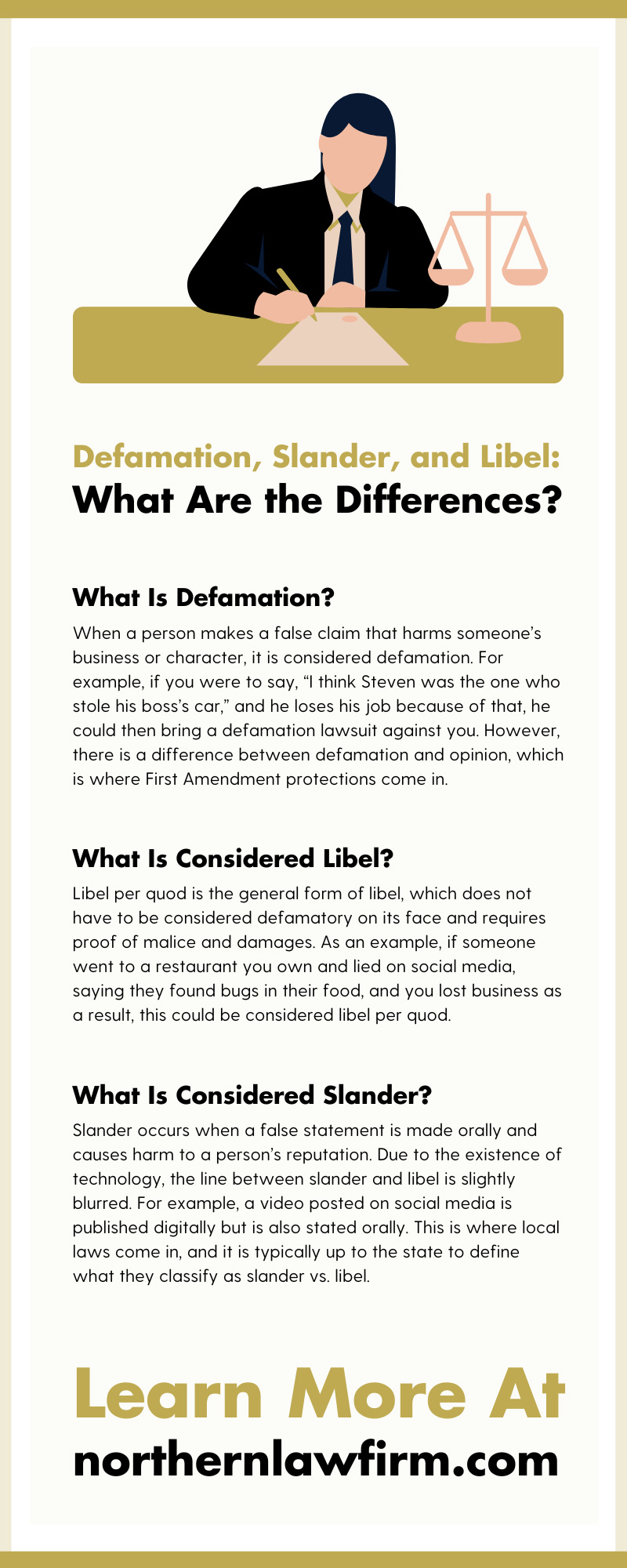When someone presents a false statement as fact and it causes harm to a person or business, is it considered defamation, slander, or libel? This is a question that often arises amongst those who aren’t familiar with defamation law, as the terms are often confused with one another. The differences between defamation, slander, and libel are fortunately quite simple, and you certainly don’t need a law degree to understand them.
What Is Defamation?
Here in America, our first amendment right guarantees our ability to practice free speech. Many people believe that means you can say whatever you want without consequence, which is far from true, and defamation is one of these limitations.
When a person makes a false claim that harms someone’s business or character, it is considered defamation. For example, if you were to say, “I think Steven was the one who stole his boss’s car,” and he loses his job because of that, he could then bring a defamation lawsuit against you. However, there is a difference between defamation and opinion, which is where First Amendment protections come in. You can legally say, “I don’t think Steven is good at his job,” because this statement can’t be proven as fact.
Public vs. Private Figures
For a plaintive to receive compensation for a defamation suit, they must prove that the defendant was at fault. Proving that fault depends on who was defamed and whether they were a private or public figure. In general, it is easier to prove defamation if you are a private citizen, as there is a higher standard of requirement if you’re a public figure. This is because the statement must have been made with the knowledge that their claim is untrue or the truth was uncertain in order to be considered defamation.
If you were to make a false claim about a celebrity (a public figure), the malice standard applies. The malice standard means that the defendant knowingly made a false statement and acted in malice, which isn’t easy to prove. However, the malice standard does not apply to private citizens, making it much easier to make a successful claim when the plaintiff is a private figure.
What Is Considered Libel?
Now that we know the ins and outs of defamation, let’s get into more specific terms. Libel is a published false statement and can include pictures, writing, or forms of digital communication. This includes but is not limited to blogs, social media, books, and newspapers. In order to be considered libel, a plaintiff must be able to show four key elements: publication, identification, harm, and fault.
Summarily, there are two different forms of libel known as libel per se and libel per quod. Libel per se essentially means that the statement is so egregious and false that the plaintiff doesn’t have to adhere to the malice standard or show how they were damaged. Egregious statements that are considered libel per se include:
- Accusations of a criminal offense
- Accusations of having an infectious disease
- Accusations of professional integrity or competence
Libel per quod is the general form of libel, which does not have to be considered defamatory on its face and requires proof of malice and damages. As an example, if someone went to a restaurant you own and lied on social media, saying they found bugs in their food, and you lost business as a result, this could be considered libel per quod. If someone wrote a book and lied, stating that they saw you murder someone, and you lose your job or face criminal charges, this could be considered libel per se, as such an accusation is considered egregious.
What Is Considered Slander?
Slander occurs when a false statement is made orally and causes harm to a person’s reputation. Due to the existence of technology, the line between slander and libel is slightly blurred. For example, a video posted on social media is published digitally but is also stated orally. This is where local laws come in, and it is typically up to the state to define what they classify as slander vs. libel. However, there are a few general elements that must be present in order for a statement to be considered libel: false oral statement, third-party communication, fault, and harm.
Much like libel, there is slander per se and slander per quod. Slander per quod is what we generally understand as slander, where intent and harm must be proven. Again, much like libel per se, slander per se must include a statement that is so grossly false that there is no doubt that harm and malice were intended. Slander per se has the same qualifying elements as libel per se.
If the host of a podcast were to accuse you of having a communicable disease falsely and knowingly, it could be considered slander per se. If someone during a work meeting falsely accuses you of stealing money from your employer, this would be considered normal slander, or slander per quod.
What Are the Differences Between These Three Terms?
Slander and libel are both types of defamation, and the difference between them lies in their methods. In order for a statement to be considered slander, it must be made orally and communicated to third parties. However, in order for a statement to be considered libel, it must be published physically or digitally. Additionally, although their methods are different, the damages that occur as a result are generally the same. These include loss of future earnings or business due to reputational damage, medical bills, as well as pain and suffering.
What Are the Defenses for Defamation?
In order for a defendant to avoid liability, they would have to be able to prove that the statement made was either truthful or an opinion. They could also retract the statement, or if the communication was privileged, then the defendant may be able to avoid liability. Privilege communication includes but is not limited to conversations between healthcare professionals, spouses, or statements made during a judicial proceeding. Ultimately, defamation is hard to prove and hard to defend, as the statement in question must be empirically found to be true or false.
Has an ex made a false statement or claim against you that caused you physical, emotional, or financial distress? Has a competitor made an untrue assertion about you or your business that’s caused you harm or financial loss? Northern Legal is a family law firm that practices family law but also frequently engages in business law and estate law. Contact us today, and we can put you in contact with one of our dedicated and experienced attorneys.


